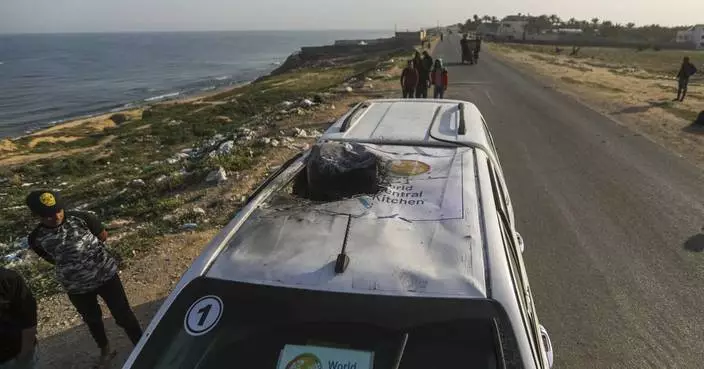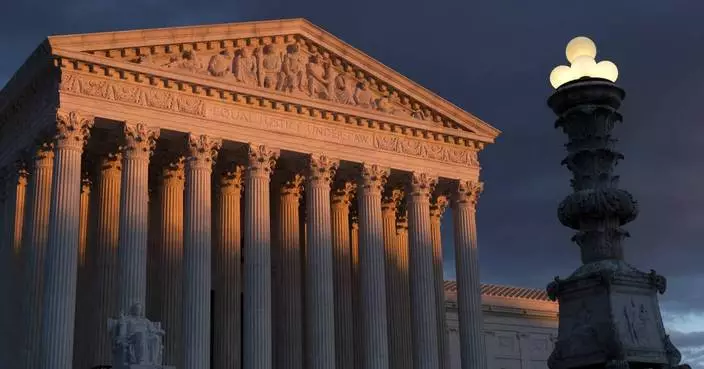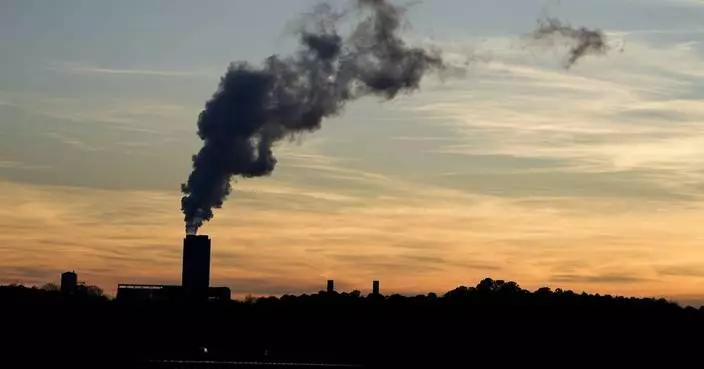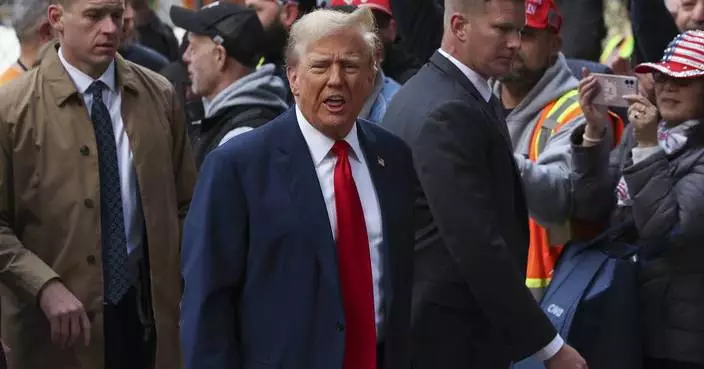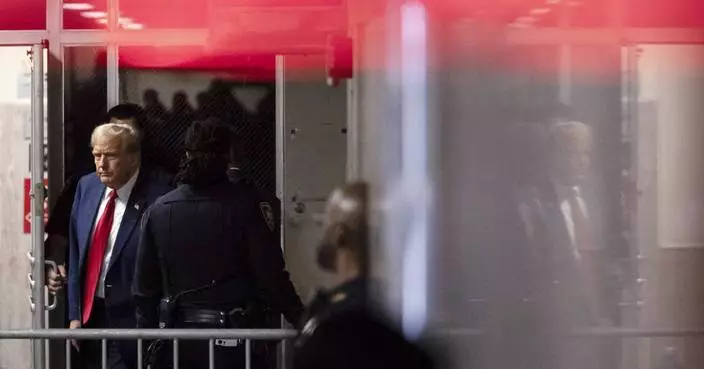After once boasting he would "take a bullet" for Donald Trump, the president's longtime personal lawyer and fixer Michael Cohen fired a possible warning shot toward the White House, saying he now puts "family and country first."
In his first interview since federal agents raided his home and hotel room three months ago as part of an investigation into his business dealings, Cohen made clear that protecting Trump is not his priority.
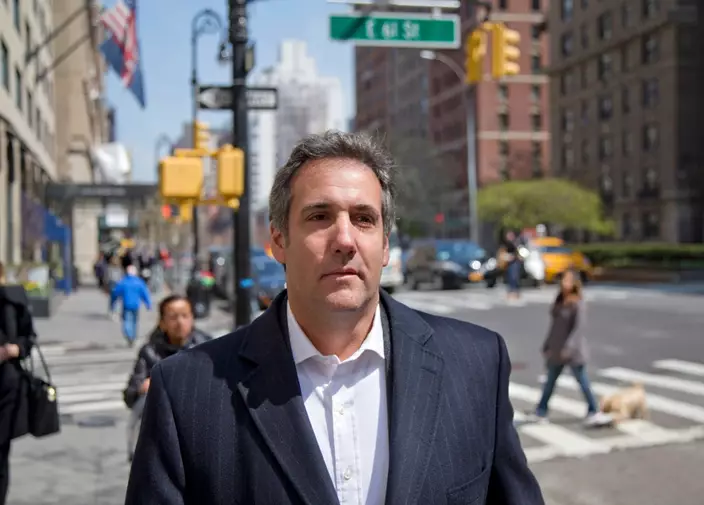
FILE - In this April 11, 2018, file photo, attorney Michael Cohen walks down the sidewalk in New York. Cohen, President Donald Trump's longtime personal lawyer who is under investigation by federal prosecutors in New York, said in his Twitter post Sunday, July 1, that he sat down for an interview with ABC News and his "silence is broken." (AP Photo/Seth Wenig, File)
"My wife, my daughter and my son have my first loyalty and always will," Cohen told ABC's George Stephanopoulos in an off-camera interview that was reported on Monday's "Good Morning America." ''I put family and country first."
Cohen, who hasn't been charged, wouldn't say if he would cooperate with prosecutors in the probe. But he also did nothing to dampen such speculation, taking issue with some of Trump's criticisms of the special counsel's Russia investigation and even going out of his way to praise the FBI.
"I don't agree with those who demonize or vilify the FBI," Cohen was quoted as saying. The raid, he added, "was obviously upsetting to me and my family. Nonetheless, the agents were respectful, courteous and professional."
Robert Mintz, a former federal prosecutor now in private practice, said that Cohen "has sent every signal he possibly can to prosecutors that he will put his own interests first and will jump at any deal that may save him from going to jail."
"By putting distance between himself and the president on issues both large and small," Mintz added, "he's telegraphing to prosecutors that he intends to be his own man and in the end will do exactly what he thinks is best for himself and his family."
White House spokeswoman Sarah Huckabee Sanders would not comment on whether the president was concerned about the possibility Cohen would strike a deal with prosecutors.
"I'm not going to weigh in to this issue and I refer you to outside counsel," she said.
The Cohen interview was released on the same day that a former federal judge vetting material seized from him said in a court filing that over a million items were turned over to prosecutors after she determined they weren't protected by attorney-client privilege.
Cohen was Trump's self-described fixer and a key player in the Trump Organization for more than a decade, regularly berating reporters and threatening lawsuits against anyone who posed a challenge to his boss.
In a Fox News interview last year, Mr. Cohen declared: "I will do anything to protect Mr. Trump." He also told Vanity Fair, "I'm the guy who would take a bullet for the president," adding, "I'd never walk away."
A day after he tweeted "I will always protect my POTUS" in April, the FBI raided his home, office and hotel room as part of a probe by federal prosecutors in New York into his business dealings.
Among other things, investigators are looking into a $130,000 payment he handled as part of a confidentiality agreement with porn star Stormy Daniels, who says she had an affair with Trump in 2006. Trump denies that.
Cohen in the past has said that the payment was made on his own initiative. But in the ABC interview, he said he couldn't comment on advice of his lawyer.
"I want to answer. One day I will answer," he said.
Stephanopoulos said he asked Cohen repeatedly if he was considering cooperating with prosecutors in their investigation. Cohen responded that if he is charged with anything, he would defer to his new lawyer in the case, Guy Petrillo, for advice.
Petrillo did not immediately respond to a request for comment. There's been no indication that he's been in contact with prosecutors about his client cooperating.
Cohen repeated previous denials that he had any involvement with Russian attempts to interfere with the 2016 presidential election, but he refused to criticize the investigation led by former FBI Director Robert Mueller.
"I don't like the term 'witch hunt,'" Cohen was quoted as saying.
He was asked how he might respond if the president or his legal team came after him and tried to discredit the work he did for Trump over the last decade.
"I will not be a punching bag as part of anyone's defense strategy," Cohen said. "I am not a villain of this story, and I will not allow others to try to depict me that way."
He also told ABC he did not agree with Trump's recent tweet repeating Vladimir Putin's claim that Russia did not interfere in the election.
"Simply accepting the denial of Mr. Putin is unsustainable," Cohen said. "I respect our nation's intelligence agencies' ... unanimous conclusions."
WASHINGTON (AP) — The U.S. Supreme Court on Thursday took up Donald Trump's bid to avoid prosecution over his efforts to overturn his 2020 election loss to Democrat Joe Biden.
Trump’s lawyers argue that former presidents are entitled to absolute immunity for their official acts. Otherwise, they say, politically motivated prosecutions of former occupants of the Oval Office would become routine and presidents couldn’t function as the commander in chief if they had to worry about criminal charges.
Lower courts have rejected those arguments, including a unanimous three-judge panel on an appeals court in Washington. And even if the high court resoundingly follows suit, the timing of its decision may be as important as the outcome.
That’s because Trump, the presumptive 2024 Republican presidential nominee, has been pushing to delay the trial until after the November election, and the later the justices issue their decision, the more likely he is to succeed.
The court typically issues its last opinions by the end of June, which is roughly four months before the election.
Currently:
What to listen for during Supreme Court arguments on Donald Trump and presidential immunity
The Supreme Court will decide whether Trump is immune from federal prosecution. Here’s what’s next
What to know in the Supreme Court case about immunity for former President Trump
Trump is in New York for the hush money trial while the Supreme Court hears his immunity case in DC
Follow the AP’s coverage of the U.S. Supreme Court at https://apnews.com/hub/us-supreme-court
Here's the latest:
The team under Special Counsel Jack Smith, which wrote that a lack of previous criminal charges “underscores the unprecedented nature” of what Donald Trump is accused of, is up before the Supreme Court in Trump's bid to avoid prosecution over his efforts to overturn his 2020 election loss to Democrat Joe Biden.
Michael Dreeben, a lawyer for the Smith team, said the court has never before recognized absolute immunity for a former president. “Such presidential immunity,” he said, “has no foundation in the Constitution.”
Justice Clarence Thomas asked Dreeben whether he was saying that there was no immunity even for official acts.
Dreeben said yes and also that impeachment and conviction before the Senate is not a prerequisite for a courtroom prosecution. Dreeben said there are plenty of checks to prevent politically motivated prosecutions.
Thomas said that other presidential acts in the past would have seemed ripe for prosecution and yet none occurred. Dreeben responded that the core distinction is that those other acts were not crimes.
Dreeben said the Smith team was not endorsing a system in which presidents would be exposed to prosecution for mistakes or bad judgments.
Justice Neil Gorsuch posed a line of questions Thursday that appeared friendly to arguments by Trump's lawyers in his bid to avoid prosecution over his efforts to overturn his 2020 election loss to Democrat Joe Biden.
Gorsuch suggested that if presidents fear they could be prosecuted after they leave office, they could begin preemptively pardoning themselves.
“We’ve never answered whether a president can do that. And happily, it’s never been presented to us,” he said.
But Justice Amy Coney Barrett took issue with a key argument of the Trump team — that under the Constitution, former presidents must be impeached and convicted before the Senate before they can be prosecuted in court.
Barrett said no one has ever suggested the justices would need to be impeached and convicted before they could be prosecuted. Trump lawyer D. John Sauer responded that under the Constitution, the sequence is only mandatory as it relates to former presidents.
Some Supreme Court justices posed scenarios or expressed skepticism Thursday as arguments started in Donald Trump’s bid to avoid prosecution over his efforts to overturn his 2020 election loss to Democrat Joe Biden.
Conservative Justice Samuel Alito said he considered it “implausible” that a president could legally order Navy SEALs to order the assassination of a political rival. That skepticism matters because the hypothetical is something the Trump team, which includes attorney D. John Sauer, has suggested could theoretically be protected from prosecution.
Conservative Justice Amy Coney Barrett asked Sauer a question that cut to the heart of the case, reading aloud allegations from the indictment and asking him to respond whether Trump’s actions in each instance were private or official.
Trump’s attorneys concede that immunity does not extend to personal actions but instead protects official acts. Sauer said he believed most of the acts are unquestionably official.
Chief Justice John Roberts, who could be a key swing vote, struck a skeptical note about the idea of expunging from the indictment acts that are official rather than personal, saying such a move would render the case a “one-legged stool.”
Liberal Justice Ketanji Brown Jackson said Sauer was asking for a change in the immunity law. She raised Richard Nixon’s pardon, asking, “I think that if everybody thought that presidents couldn’t be prosecuted, then what was that about?"
Liberal Justice Elena Kagan noted the Founding Fathers did not insert an immunity clause for presidents into the Constitution — but, she said, “they knew how to.”
Supreme Court Justice Clarence Thomas pressed Donald Trump's lawyer D. John Sauer at the outset of arguments Thursday, asking where the principle of absolute immunity comes from.
The question was the first during arguments at the Supreme Court in Trump’s bid to avoid prosecution over his efforts to overturn his 2020 election loss to Democrat Joe Biden.
Sauer fell back quickly on a Supreme Court case that’s core to the defense — a 1982 decision that held that former presidents are immune from civil lawsuits.
A skeptical Justice Sonia Sotomayor pointedly noted to Sauer that the indictment alleges that Trump acted for personal gain.
She said the Founding Fathers had contemplated the idea of immunity for presidents but had explicitly decided against it.
She made clear her opposition to the Trump legal team’s position, saying she was having a hard time envisioning immunity for a president who creates and submits false documents, orders the assassination of a political rival, and any number of other criminal acts.
First up on Thursday was D. John Sauer, making Donald Trump’s argument that he’s immune from criminal prosecution. A former Missouri solicitor general and onetime Supreme Court clerk, Sauer also represented Trump at the appeals court level.
Trump went to those arguments even though he wasn’t required to be there, but he won’t be in the audience at the Supreme Court today. He’s required to be in New York for his hush money trial.
About 30 demonstrators gathered outside the Supreme Court before arguments, some wearing judicial robes with kangaroo masks and others holding signs like “Justice Delayed Is Justice Denied.” That’s an apparent reference to the the timing of the high court’s ultimate decision in the case, which could determine whether a trial can be held before the election in November.
Shortly before arguments were slated to begin, Trump fired off a few posts Thursday on his social media network.
In one, he declared in all caps, “WITHOUT PRESIDENTIAL IMMUNITY, IT WOULD BE IMPOSSIBLE FOR A PRESIDENT TO PROPERLY FUNCTION, PUTTING THE UNITED STATES OF AMERICA IN GREAT AND EVERLASTING DANGER!”
Trump also said that without immunity, a president would just be “ceremonial” and the opposing political party “can extort and blackmail the President by saying that, ‘if you don’t give us everything we want, we will Indict you for things you did while in Office,’ even if everything done was totally Legal and Appropriate.”
Of the nine justices hearing the case, three were nominated by Trump — Amy Coney Barrett, Neil Gorsuch and Brett Kavanaugh. But it’s the presence of a justice confirmed decades before Trump’s presidency, Justice Clarence Thomas, that’s generated the most controversy.
Thomas’s wife, Ginni Thomas, urged the reversal of the 2020 election results and then attended the rally that preceded the Capitol riot. That has prompted calls for the justice to step aside from several court cases involving Trump and Jan. 6.
But Thomas has ignored the calls, taking part in the unanimous court decision that found states cannot kick Trump off the ballot as well as last week’s arguments over whether prosecutors can use a particular obstruction charge against Capitol riot defendants.
The justices will probably meet in private a short time after arguments to take a preliminary vote on the outcome. Chief Justice John Roberts would be a prime candidate to take on the opinion for the court, assuming he is in the majority.
They could simply reject Trump’s immunity claim outright, permitting the prosecution to move forward and returning the case to U.S. District Judge Tanya Chutkan to set a trial date.
They could also reverse the lower courts by declaring for the first time that former presidents may not be prosecuted for conduct related to official acts during their time in office. Such a decision would stop the prosecution in its tracks.
There are other options, too, including ruling that former presidents do retain some immunity for their official actions but that, wherever that line is drawn, Trump’s actions fall way beyond it.
Yet another possibility is that the court sends the case back to Chutkan with an assignment to decide whether the actions Trump is alleged to have taken to stay in power constitute official acts.
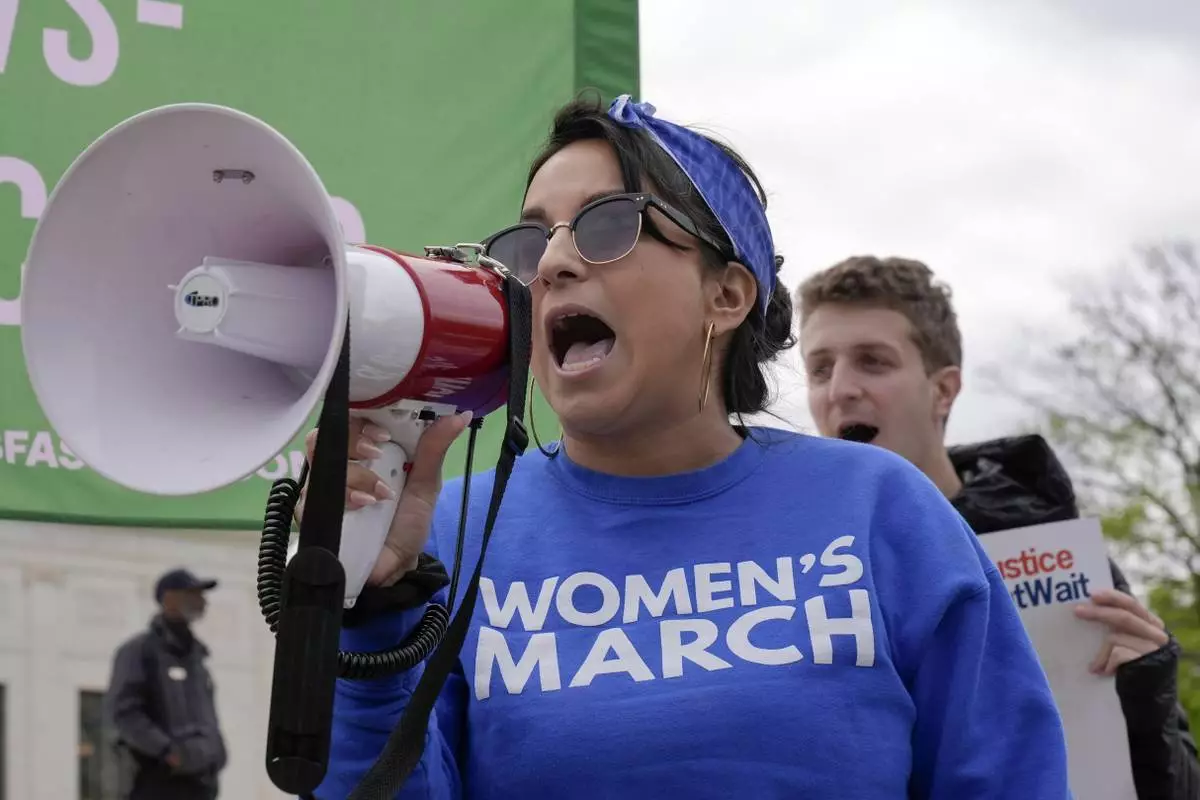
Demonstrators protest outside the Supreme Court as the justices prepare to hear arguments over whether Donald Trump is immune from prosecution in a case charging him with plotting to overturn the results of the 2020 presidential election, on Capitol Hill Thursday, April 25, 2024, in Washington. (AP Photo/Mariam Zuhaib)
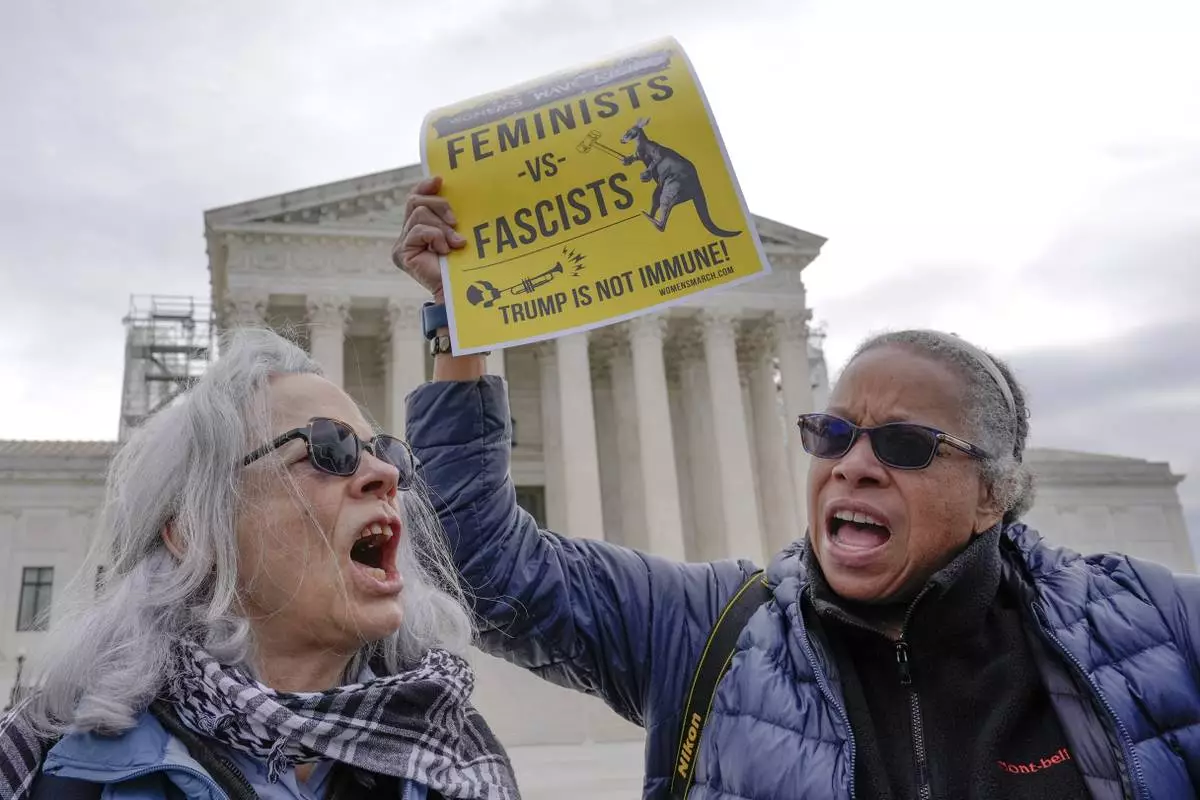
Demonstrators protest outside the Supreme Court as the justices prepare to hear arguments over whether Donald Trump is immune from prosecution in a case charging him with plotting to overturn the results of the 2020 presidential election, on Capitol Hill Thursday, April 25, 2024, in Washington. (AP Photo/Mariam Zuhaib)
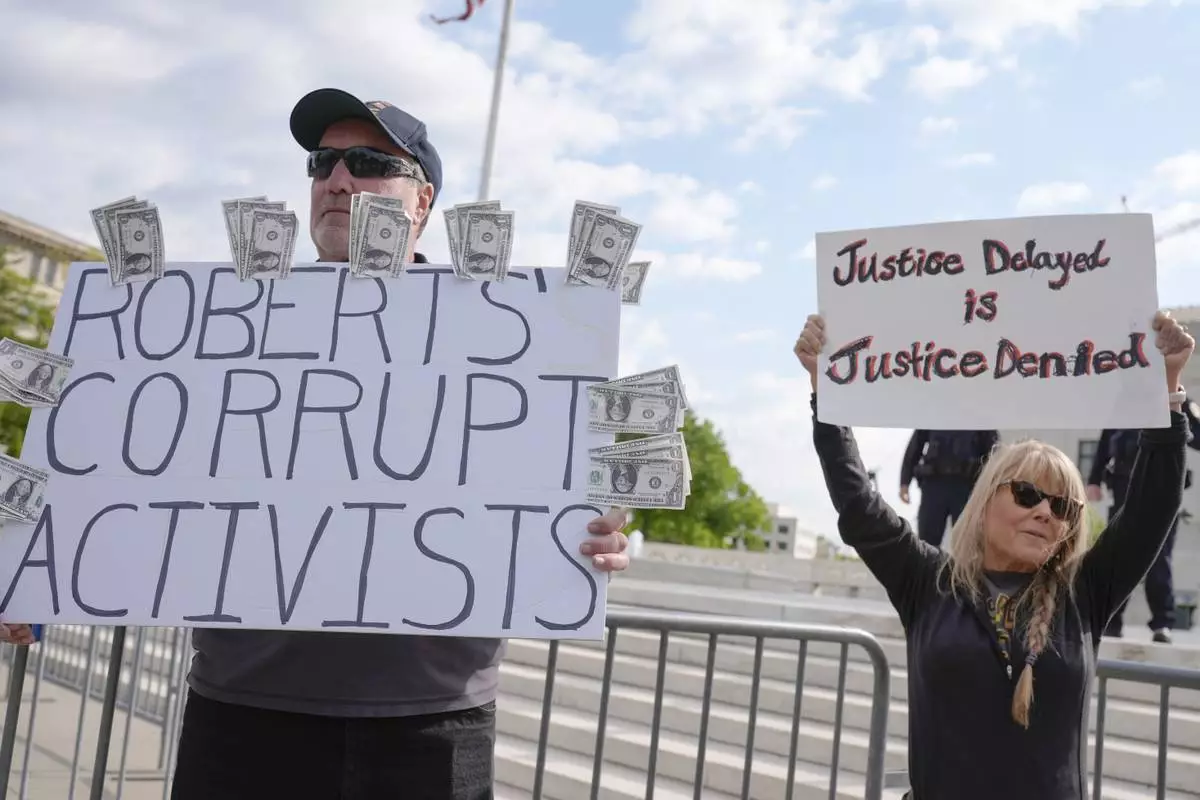
Demonstrates stand outside the Supreme Court as the justices prepare to hear arguments over whether Donald Trump is immune from prosecution in a case charging him with plotting to overturn the results of the 2020 presidential election, on Capitol Hill Thursday, April 25, 2024, in Washington. (AP Photo/Mariam Zuhaib)
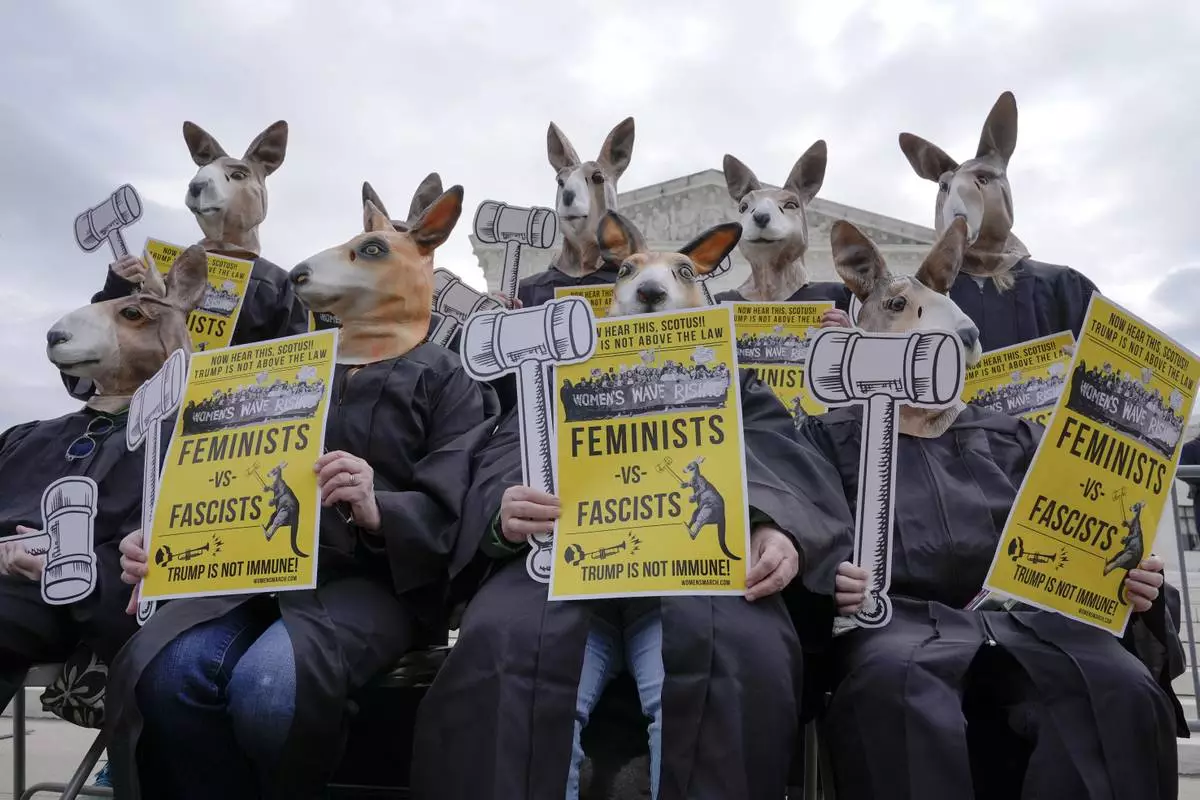
Demonstrates stand outside the Supreme Court as the justices prepare to hear arguments over whether Donald Trump is immune from prosecution in a case charging him with plotting to overturn the results of the 2020 presidential election, on Capitol Hill Thursday, April 25, 2024, in Washington. (AP Photo/Mariam Zuhaib)
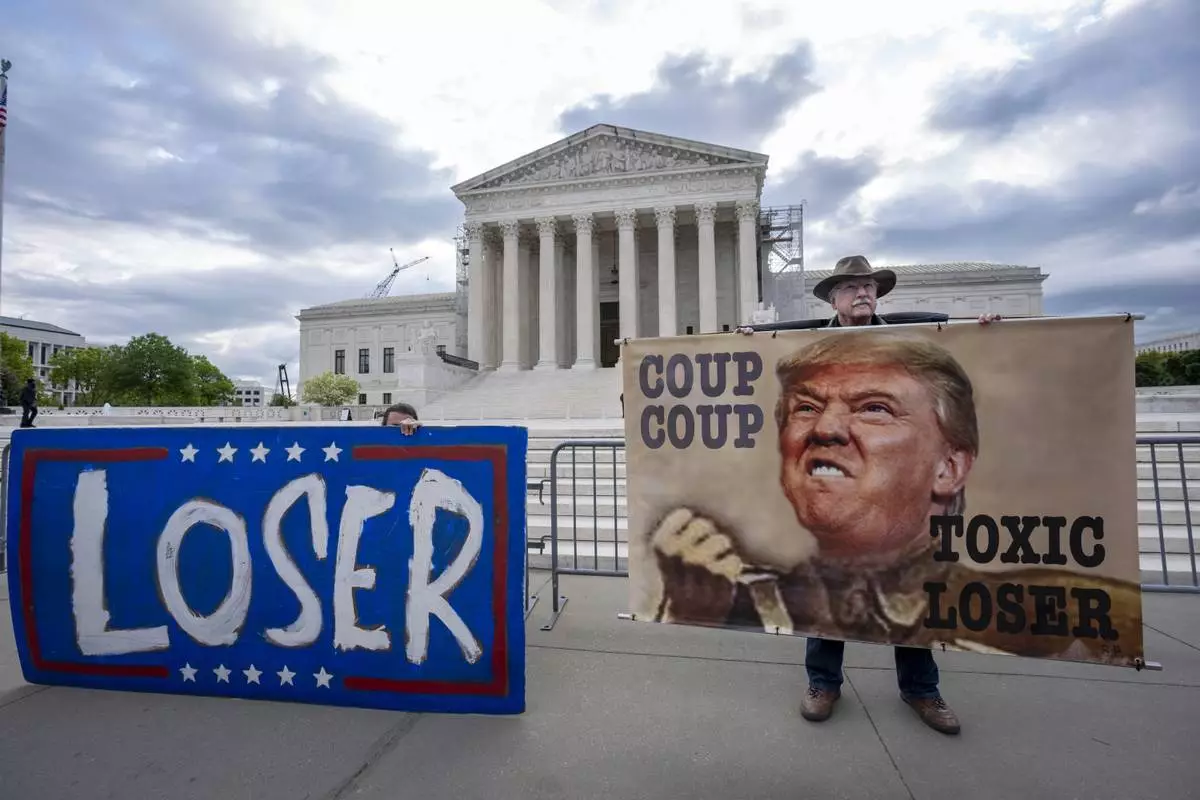
Activist Stephen Parlato of Boulder, Colo., right, joins other protesters outside the Supreme Court as the justices prepare to hear arguments over whether Donald Trump is immune from prosecution in a case charging him with plotting to overturn the results of the 2020 presidential election, on Capitol Hill in Washington, Thursday, April 25, 2024. (AP Photo/J. Scott Applewhite)









